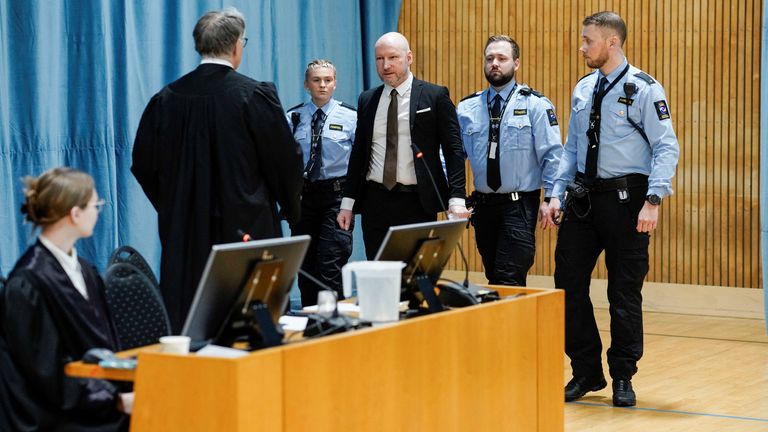The far-right fanatic who killed 77 people in Norway in 2011 is suing the country in a bid to end his years in isolation.
Anders Behring Breivik, who emailed out copies of a manifesto setting out his theories before his attacks, killed eight people with a car bomb in Oslo then shot dead 69 others at a Labour Party youth camp.
It was Norway’s worst peacetime atrocity, with most of the victims being teenagers.
His lawyer argues the isolation in prison has left Breivik – who is serving Norway’s maximum sentence of 21 years – suicidal and dependent on the anti-depression medication Prozac.
“He has been isolated for about 12 years,” his lawyer Oeystein Storrvik told the hearing. “He is only in contact with professionals, not with other inmates.”
Breivik, who wore a black suit, white shirt and brown tie, said nothing as he entered the hearing, which was set up in the gym of the high-security prison 70km (40 miles) northwest of Oslo.
The 44-year-old spends his time in a dedicated section of Ringerike prison, which is the third prison where he has been held.
His area includes a kitchen, TV room and bathroom, pictures from a visit last month by news agency NTB showed.
He is also allowed to keep three budgerigars as pets who fly freely in the area, NTB reported.
Lawyers for the justice ministry say Breivik must be kept apart because of the continuing security threat he poses.
Breivik was cited as an inspiration by Brenton Tarrant, who killed 51 people in two mosques in Christchurch, New Zealand in 2019.
Read more:
Norwegian terrorist still ‘very dangerous’ after 10 years in jail
Norwegian court rejects mass murderer’s parole application
Lawyers argue control over Breivik’s contacts with the outside world is justified by the risk that he will inspire others to commit violent acts.
“Specifically, this applies to contacts with far-right circles, including people who wish to establish contact with Breivik as a result of the terrorist acts on 22 July 2011,” they said in the filing.
They also said in their court filing his isolation was “relative”, given he has contacts with guards, a priest, health professionals and, until recently, an outside volunteer.
Breivik’s sentence can be extended for as long as he is deemed a threat.
The judge’s verdict – there is no jury – will be issued in coming weeks.



